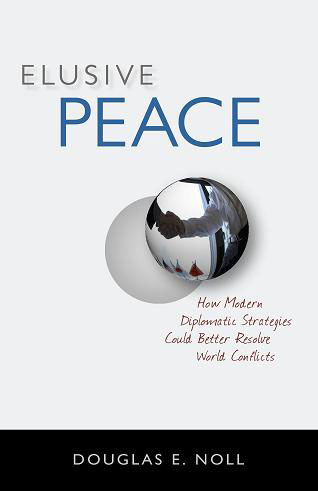Excerpt from Chapter 1 - The Problems with Diplomatic Negotiations
Everyone wants world peace. Miss America wants to work for peace. Churches pray for it. Every Friday afternoon in the beach town of Carpinteria, California, a dozen or so people hold up signs demanding world peace. It is every good person’s birthday wish. But how to get there?
The headlines don’t give us much hope. Peace talks fail; negotiations over climate change fail; Iran is developing The Bomb. Afghanistan is an expensive mess, and the Sunnis and Shia are duking it out in Iraq. There seems to be more war and strife than ever before.
The cost of conflict is high. When you include veterans’ obligations, interest on the amount borrowed to finance defense spending, and cost of the wars in Iraq and Afghanistan, about 54 cents of each U.S. tax dollar pays for the military. The U.S. spends more on defense than the entire world put together.
International conflicts affect us all, and our inability to solve them threatens our very existence on the planet. The threat is to our personal security, our communities, and to our environment.
Why can’t these problems be solved? That’s the question I asked myself. I began to wonder why we can successfully mediate deeply painful conflicts like clergy sexual abuse and serious criminal offenses between victims and offenders, but not international conflicts. So I started to study the problem from my perspective as a professional mediator. What I learned was that the people in charge of international mediations and negotiations, while highly distinguished politicians and diplomats, are not always as skilled in the art and science of modern negotiation and peacemaking as they might be. In many cases, they are using old ideas and antiquated assumptions in their efforts to solve 21st century problems.
Imagine sending a board certified oncologist who specializes in colon cancer into a busy urban emergency room on a Friday night. The oncologist may get through the shift, but not nearly as gracefully or as skillfully as the board certified emergency room surgeon who has spent ten years working in a major trauma center. This metaphor describes the current use of former politicians and diplomats to intervene in international conflicts. We are sending in the oncologist, not the trauma surgeon, to handle the crisis.
In many cases, international mediators lack the experience and knowledge of how to deal with complex conflicts. Very few, if any, international mediators have had much mediation experience measured by the number of conflicts formally mediated. By way of contrast, the average successful U.S. commercial mediator mediates more complex cases in a year than most international mediators have mediated in their careers. That is not to say that quantity is better than quality or that a complex commercial case is equivalent to an international conflict. However, in addition to the lack of formal training, the actual experience of mediating conflicts between people who are at war with each other is quite limited. The trauma center surgeon sees hundreds of medical emergencies, minor and major every week. The oncologist, simply because of the nature of his or her practice, sees none.
In other cases, the processes used to work with difficult conflicts harkened back to white wigs, frocked coats, and silk stockings. Too many diplomats and foreign ministers still believe in 18th century ways of diplomacy and negotiation. Everyone knows that the 21st century world is very different than 18th century Europe. The world is a complex place requiring a much more nuanced approach.
These complexities seem to stymie the ability of international negotiators to engage each other constructively when there are huge chasms of difference. When nations do come together, they are often cast into an unwieldy process that is often non-productive. Not surprisingly, international negotiators often end up angry and disgruntled with each other. The media inflames these failures, making things worse.
Our only hope is to abandon the old processes in favor of approaches to conflict that take into account the knowledge we have gained in a vast array of disciplines around decision-making, neuropsychology, and human behavior. It invokes processes that promote collaboration and discourage competition. It is a critical next step in bringing peace to the world.

